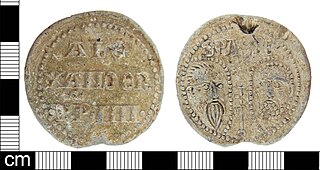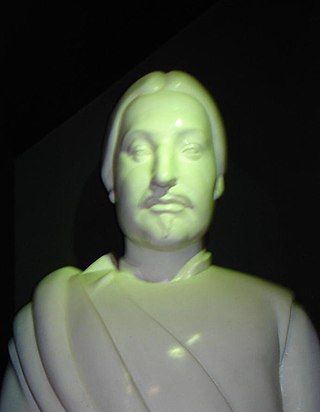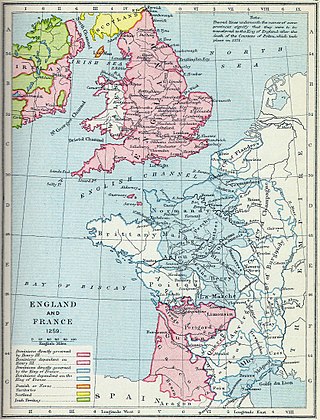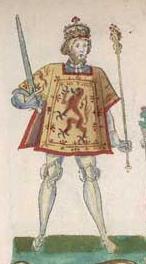Related Research Articles

Pope Alexander IV was head of the Catholic Church and ruler of the Papal States from 12 December 1254 to his death.

John Balliol or John de Balliol, known derisively as Toom Tabard, was King of Scots from 1292 to 1296. Little is known of his early life. After the death of Margaret, Maid of Norway, Scotland entered an interregnum during which several competitors for the Crown of Scotland put forward claims. Balliol was chosen from among them as the new King of Scotland by a group of selected noblemen headed by King Edward I of England.

Amadeus V, also known as Amadeus the Great, was the Count of Savoy from 1285 until his death in 1323. He was a significant medieval ruler who played a crucial role in the expansion and consolidation of the House of Savoy’s influence in the regions that are now part of modern-day France, Italy, and Switzerland.

Robert II of Burgundy was duke of Burgundy between 1272 and 1306 as well as titular king of Thessalonica.

John II reigned as Duke of Brittany from 1286 until his death, and was also Earl of Richmond in the Peerage of England. He took part in two crusades prior to his accession to the ducal throne. As a duke, John was involved in the conflicts between the kings of France and England. He was crushed to death in an accident during the celebrations of a papal coronation.
The Treaty of Edinburgh was a treaty drawn up on 5 July 1560 between the Commissioners of Queen Elizabeth I of England with the assent of the Scottish Lords of the Congregation, and the French representatives of King Francis II of France to formally conclude the siege of Leith and replace the Auld Alliance with France with a new Anglo-Scottish accord, while maintaining the peace between England and France agreed by the Treaty of Cateau-Cambrésis.

Louis of Évreux was a Capetian prince and count of Évreux. He was the only son of King Philip III of France and his second wife Marie of Brabant, and thus a half-brother of King Philip IV.
Donnchadh III or Duncan was Earl of Fife from 1270 to 1288.

William II, Earl of Ross was ruler of the province of Ross in northern Scotland, and a prominent figure in the Wars of Scottish Independence.

John Comyn II of Badenoch, Lord of Badenoch, nicknamed the Black Comyn, was a Scottish nobleman, a Guardian of Scotland, and one of the six Regents for Margaret, Maid of Norway. His father was John Comyn I of Badenoch.
Magnus Magnusson was Earl of Orkney from 1273 to 1284. In 1284 he joined with other Scottish noblemen who acknowledged Margaret of Norway as the heir of Alexander.

Alexander Comyn, 2nd Earl of Buchan was a Scoto-Norman magnate who was one of the most important figures in the 13th century Kingdom of Scotland. He was the son of William Comyn, Lord of Badenoch, and Marjory, Countess of Buchan, the heiress of the last native Scottish Mormaer of Buchan, Fergus. He was the chief counsellor of Alexander III, King of Alba (Scotland) for the entire period of the king's majority and as Scotland's leading magnate, played a key role in safeguarding the independence of the Scottish monarchy. During his long career, Alexander Comyn was Justiciar of Scotia (1258–1289), Constable of Scotland (1275–1289), Sheriff of Wigtown (1263–1266), Sheriff of Dingwall (1264–1266), Baillie of Inverie and finally, Guardian of Scotland (1286–1289) during the first interregnum following the death of Alexander III. In 1284 he joined with other Scottish noblemen who acknowledged Margaret of Norway as the heiress to King Alexander. He died sometime after 10 July 1289.
The Treaty of Perpetual Peace was signed by James IV of Scotland and Henry VII of England in 1502. It agreed to end the intermittent warfare between Scotland and England which had been waged over the previous two hundred years, and, although it failed in this respect, as hostilities continued intermittently throughout the 16th century, it led to the Union of the Crowns 101 years later.

The 1303 Treaty of Paris was a peace treaty between King Edward I of England and Philip IV of France that ended the 1294–1303 Gascon War. It was signed at Paris on 20 May 1303, largely provided for a return to the status quo ante, and maintained peace between the two realms until the 1324 War of Saint-Sardos.

Sir Ingram de Umfraville was a Scottish noble who played a particularly chequered role in the Wars of Scottish Independence, changing sides between England and Scotland multiple times, throughout the conflict.
John of Strathbogie was warden and Justiciary of Scotland.

The 1299 Treaty of Montreuil or Montreuil-sur-Mer was part of the negotiations between King Edward I of England and Philip IV of France during the 1294–1303 Gascon War. It provided for the betrothal of Edward's son Prince Edward of Caernarfon and Philip's daughter Isabella. It was drafted at Montreuil on 19 June 1299 and ratified by Edward I on 4 July and Philip IV on the Feast of the Invention of St Stephen.

The Treaty of York (1464) was made between England and Scotland on 1 June 1464 at York and was intended to establish 15 years of peace. Previously Scotland had supported the defeated House of Lancaster in the English civil War of the Roses.

Gaillard de La Mothe was a fourteenth-century prelate and Cardinal, of Gascon extraction. Gaillard was born towards the end of the 13th century, either in Toulouse or Bordeaux, and died in Avignon on 20 December 1356. He was the son of Amanieu Levieux de La Motte, seigneur of Roquetaillade. His mother was Elips (Alix) de Got, daughter of Arnaud-Garsale de Got, brother of Bertrand de Got. He was therefore a nephew of Pope Clement V. Gaillard had a brother, Bertrand. Another uncle, his father's brother, Guillaume de la Mothe, was Bishop of Bazas from 1303-1313, when he was transferred to Saintes, and again from 1318 to 1319.
Pierre de Chambly, also known as Pierre the Fat, Pierre VI de Chambly, or Pierre III de Chambly, was a French noble who served as chamberlain under King Philip IV of France. He was lord of Viarmes, Livry, Presles, Torigny, and (briefly) Tournan.
References
Citations
- ↑ 1303 Treaty of Paris.
- ↑ Hibbert, Christopher, ed. (1988). "Appendix 5: Chancellors of the University". The Encyclopaedia of Oxford . Macmillan. pp. 521–522. ISBN 0-333-39917-X.
- ↑ Wood, Anthony (1790). "Fasti Oxonienses". The History and Antiquities of the Colleges and Halls in the University of Oxford. p. 14 – via Internet Archive.
- 1 2 British History Online Bishops of Winchester Archived 14 February 2012 at the Wayback Machine . Accessed on 2 November 2007.
- ↑ Rymer & al. (1745), "Tractatus Perpetuae Paciis & Amicitiae inter Angliae & Franciae Reges Firmatus & Juratus" [Treaty of Perpetual Peace and Friendship between the Kings of England & France Confirmed & Sworn].
Bibliography
- British History Online Bishops of Winchester accessed on 2 November 2007
- Rymer, Thomas; et al., eds. (1745), Foedera, Conventiones, Literae, et Cujuscunque Generis Acta Publica inter Reges Angliae et Alios Quosvis Imperatores, Reges, Pontifices, Principes, vel Communitates... [Treaties, Conventions, Letters, and Public Proceedings of Any Kind between the Kings of England and Any Other Emperors, Kings, Popes, Princes, or Communities...] (in Latin and French), vol. I, Pt. 4 (3rd ed.), The Hague: Jean Neaulme, pp. 24–29.
